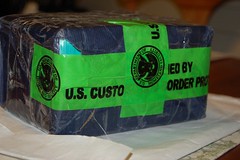If you don't know about Julie's situation, you can read my article, and there are some links in it to others that give more background. If you read security blogs at all, you probably already know all this, so I won't cover it here. The reason I haven't mentioned it before is because I was preparing that article, and because I have been working behind the scenes with others, as hinted at in the article.
I can be long-winded, so my article was over twice the length it was supposed to be, and had to be cut down a bit for the newsletter. I wanted to use the extra material here, and make an update or two.
In the ComputerCOP Pro section, I originally had this:
So what did the detective use to examine the "image"? He used a program called Computer COP Pro. Here's an example entry from the FAQ:
Q. Does Professional require training to use?So, training would be nice, but you can get away with not doing it if it's inconvenient. I'm told that training consists of an hour on the phone.
A. For a competent computer user, Professional truly does not need training to use as the detailed search applications are performed automatically by the software and the product does come with a Getting Started manual. However, because you may need to testify in court or in a hearing, it would be best to receive the company's training and certification.
Needless to say, this program really doesn't sound like it would meet my standards for a forensics utility.[and]
Since this is a key portion of the prosecution's case, Alex Shipp contacted a representative from the makers of ComputerCOP about this aspect of their software. Alex tells me:
Allison Whitney, directory of communications for ComputerCOP, confirmed that the product was unable to distinguish between URLs visited as a result of malicious software, and URLs visited by direct user action.[and]
She also confirmed that this point is not made clear during the ComputerCOP training. At this point in time, ComputerCOP have no plans to contact the Connecticut court to point out the errors in interpretation of the ComputerCOP output made by the prosecution attorney and prosecution expert witness.
Why didn't the defense present these kinds of findings? They tried. There appears to have been a procedural error on the defense's part, and the judge would not allow the defense to enter their evidence. The defense expert has publicly stated that his analysis of the computer files would have revealed that spyware was causing the pop-ups to appear and he feels the evidence would have totally exonerated Julie.
[end of extra material]
Speaking of procedural errors on the defense attorney's part, it appears that Julie is getting a new lawyer, and this may delay sentencing. This is good news. The article makes the new lawyer out to be a hot shot, which is exactly what Julie needs. Despite the fact that she has been declared guilty already, there are a couple of small chances for the case to be resolved before sentencing still, from what I understand. The prosecution could realize that there has been an error in the facts presented, and request that the verdict be vacated, for example. I'm obviously not a lawyer, so apologies if I have abused the terminology.
Despite the TV shows you see, I'm learning that appeals aren't as easy to get as you would think, so anything that helps slow this train wreck down and bring some sanity into the situation is a welcome development.





